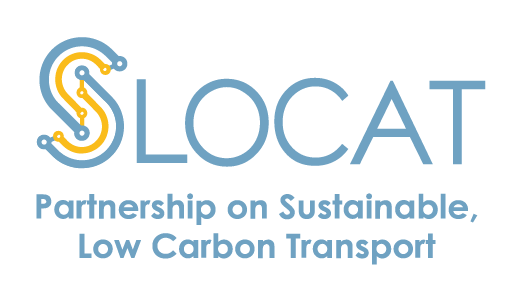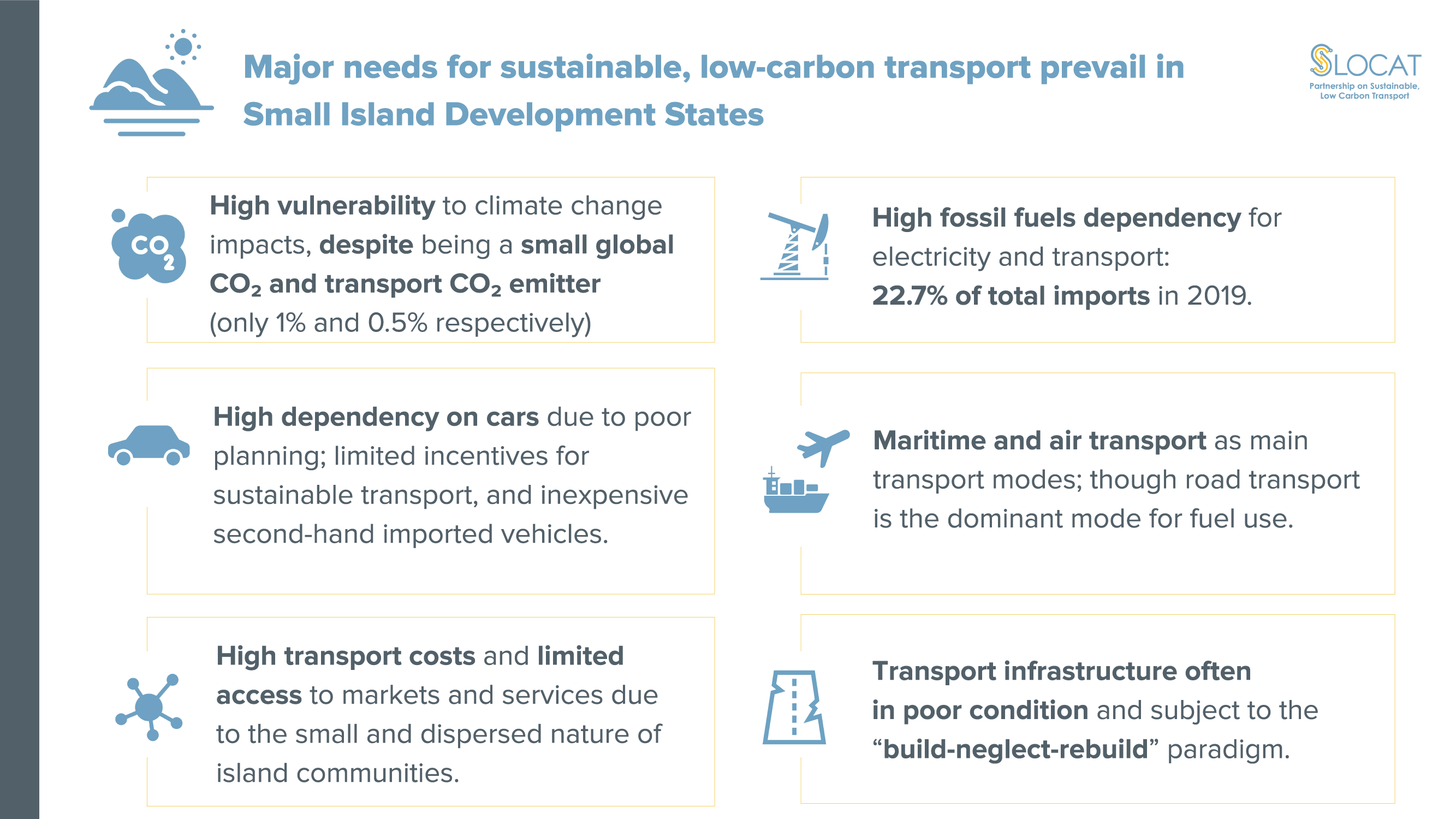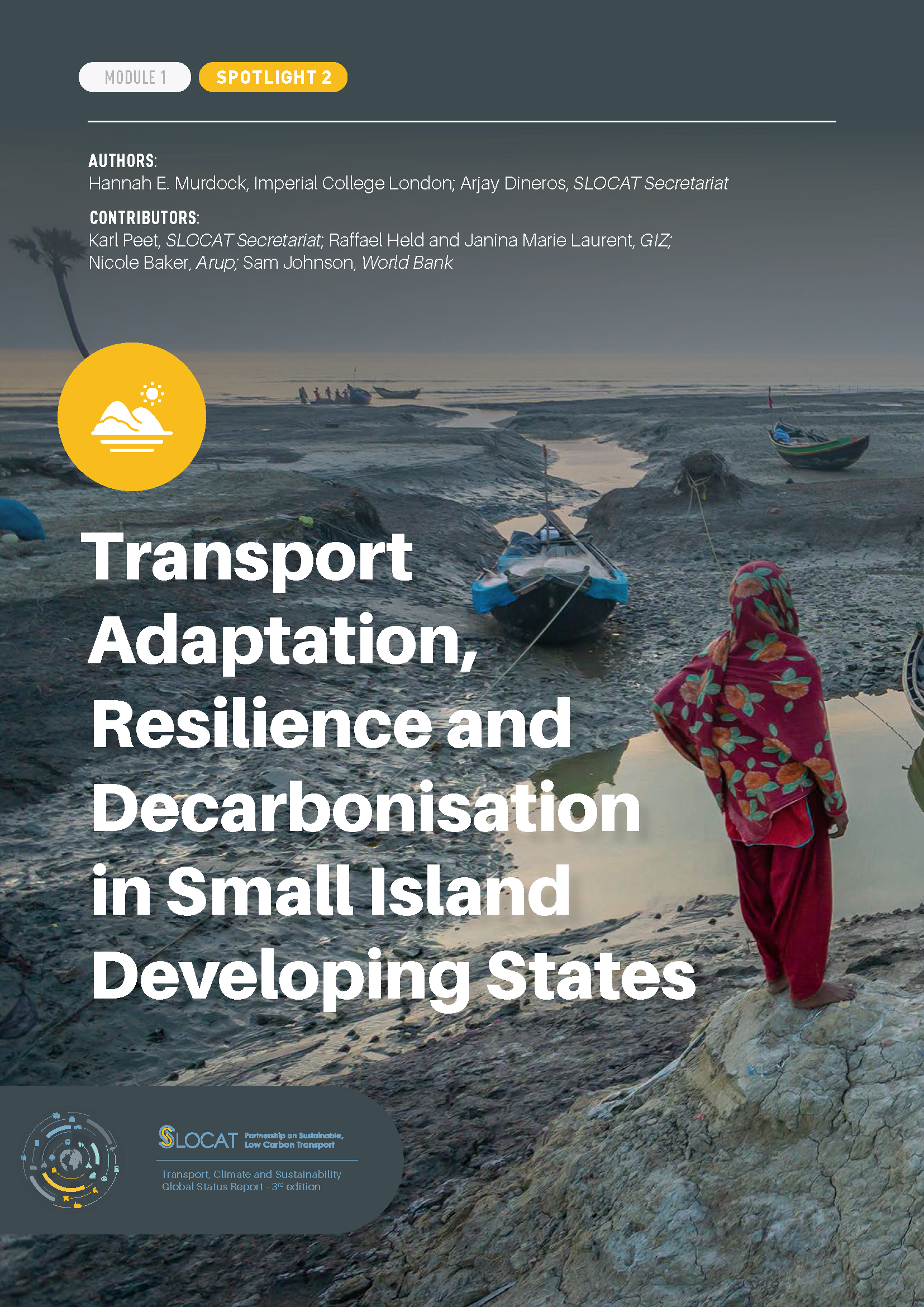-
Transport Adaptation and Decarbonisation in Small Island Developing States
- Key Findings
Context and key challenges
- Because of their limited land area and geographic location and isolation, Small Island Developing States (SIDS) are highly vulnerable to the impacts of climate change, and the resilience of transport infrastructure and services is closely tied to the resilience of SIDS communities.
- SIDS have experienced increasing incidences of climate change-related events such as tropical cyclones, storm surges, droughts, changing precipitation patterns, coral bleaching and invasive species.
- SIDS are highly dependent on fossil fuels for their transport systems, which contributes to greenhouse gas emissions and environmental degradation and undermines the resilience of countries to climate change impacts, such as sea-level rise and extreme weather events.
- Addressing transport access, decarbonisation, resilience and adaptation pathways in SIDS is crucial for achieving sustainable social, economic and environmental development and resilience.
Demand trends
- SIDS are highly dependent on maritime and air transport, although road transport is the dominant transport mode in terms of fuel use.
- The often small and dispersed nature of island communities leads to high transport costs and limited access to markets and services; meanwhile, transport infrastructure is often in poor condition and subject to the “build-neglect-rebuild” paradigm.
- Despite having strong renewable energy potential, SIDS remain highly dependent on fossil fuels for electricity and transport; fossil fuels accounted for 22.7% of total imports in 2019, and electricity costs in SIDS are among the world’s highest.
- The average motorisation rate across SIDS is an estimated 121 vehicles per 1,000 people. As elsewhere, car dependency often results from automobile-centric urban design and limited policy incentives for other forms of transport, while SIDS have the additional issue of inexpensive second-hand imported vehicles.
-
Electric cars may not be economically or environmentally feasible in SIDS in the near term for a variety of reasons, and other decarbonisation measures could be prioritised instead, such as cycling and micromobility. Still, electric vehicle uptake is on the rise in some SIDS, notably in the Caribbean islands, and in some cases the vehicles are being charged with renewable energy.
- Some SIDS have been identified as key sources for raw materials needed in global supply chains to produce electric vehicles, leading to controversy in some cases.
Emission trends
- Despite rising emissions within SIDS, together these countries represented just 1% of global carbon dioxide (CO2) emissions in 2019, yet they disproportionately experience the effects of climate change.
- SIDS contributed just 0.5% of global transport CO2 emissions in 2021 (excluding international aviation and shipping), despite their emissions growing 9.6% during 2010-2021.
- In 2020, transport CO2 emissions in SIDS fell 10% to 31.2 million tonnes, due to the impacts of the COVID-19 pandemic.
- Per capita transport CO2 emissions in SIDS vary from 0.07 tonnes in Guinea Bissau to 4.96 tonnes in Seychelles.
Policy measures
- For many SIDS, land transport accounts for the bulk of imported fuel use, followed by electricity generation and maritime transport. Thus, phasing out fossil fuels in these sectors is the main lever for both reducing emissions and increasing energy security.
- Strategies identified for SIDS to decarbonise transport are largely similar to those for decarbonising urban and land transport systems in other regions. However, strategies in SIDS also must include integrated planning for inter-island transport, greening of ports and maritime and aviation operations, use of small boats for coastal travel, a regional approach to aviation services, and adoption of low-emission aviation and shipping technology.
- SIDS have implemented a wide range of measures to enhance the resilience of their transport sectors, from systems planning and risk-based asset management systems to smartphone apps.
- Some SIDS have increased their efforts to decarbonise shipping while also pushing for greater ambition globally.
- Many SIDS have led the charge on efforts to increase climate equity, address loss and damage from the effects of climate change, and restructure financial systems.
Authors: Hannah E. Murdock, Imperial College London; Arjay Dineros, SLOCAT Secretariat
Contributors: Karl Peet, SLOCAT Secretariat; Raffael Held and Janina Marie Laurent, GIZ; Nicole Baker, Island Futures in Transport; Sam Johnson, World Bank


